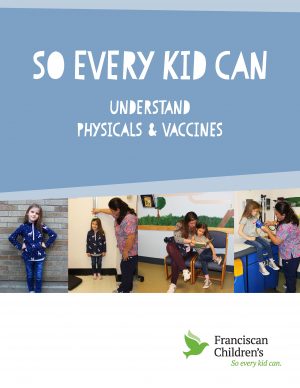Coordinated Autism Service
Dr. Amanda Platner is a licensed Clinical Psychologist who specializes in working with children with neurodevelopmental disabilities and their families. She has played a key role in developing and piloting the Coordinated Autism Service at Franciscan Children’s. The goal of this program is to educate and aid in early autism diagnosis, while also providing children with coordinated care services internally at Franciscan Children’s.

About Our Program
Program description
The Autism Service is a coordinated service for children ages 6 and under. After being referred to one of our Psychologists, the child and caregiver(s) come to Franciscan Children’s for a diagnostic interview. During this interview, the Psychologist talks with the caregiver(s) to learn about the child’s overall development. Then, the child receives a diagnostic evaluation that consists of both formal and play-based assessments. Both the interview and evaluation are diagnostic tests used for assessing autism and other neurodevelopmental issues.
Following the interview and evaluation, the Psychologist develops a treatment plan and connects the child to the appropriate services within Franciscan Children’s and coordinates outside referrals as needed. These services range from neurology, speech, therapy, feeding, nutrition and many more. Since Franciscan Children’s offers many of these services, the transition is seamless. With the original assessment complete and treatment plan in place, the Psychologist loops back with the referring provider – traditionally their pediatrician.
What are early signs that a child may have autism?
It’s important to remember that all children develop differently. However, if you notice your child is not achieving developmental milestones, talk to your pediatrician about a screening or evaluation. It’s better to screen children at a young age and develop a treatment plan than to wait until the child is older. Some signs include:
• If language is slow to develop or if it includes unusual qualities when it develops (i.e., repeating words or phrases exactly the way they were heard, using primarily repetitive language, “scripting” from TV shows).
• If you are struggling to connect socially with your child (i.e., making eye contact).
• If your child doesn’t play with toys in a traditional manner (i.e., fixating on the wheels of a toy car instead of playing with the full car).
• If your child has frequent emotional outbursts.
How early can you diagnose autism?
People often think autism can’t be diagnosed until 3 or 4 years of age, but clear developmental delays and indicators of autism can be seen as early as 15-18 months. Literature shows that children who achieve the best outcomes are largely those who received early diagnoses. Since wait lists can be long, if there are legitimate concerns, seeking an evaluation as early as 15 months is recommended.
How do treatment plans differ for each child?
Treatment plans greatly depend on the child’s age. With children under 3, early intervention and medical services are recommended as needed. Early intervention can be effective for improving language, verbal communication, and social interaction.
For children 3 and older, the treatment plan typically involves special education services at school, outpatient therapies, and medical services as needed.
What is an autism diagnostic evaluation?
There are 3 major factors taken into account during an autism diagnostic evaluation. The first involves analyzing a child’s cognitive abilities. This involves evaluating a child’s developmental functioning (verbal skills, motor skills, and nonverbal problem solving/visual reception skills). The second involves analyzing the child’s adaptive living skills (daily living, social interactions and communication skills).
The third aspect involves an Autism Diagnostic Observation Schedule, Second Edition (ADOS-2) assessment. This test is known as the “gold standard” in autism diagnosis. The ADOS-2 is a play-based assessment that encourages and observes social interaction through a series of activities meant to be fun and engaging. While the child is playing, the Psychologist is able to analyze aspects of their behavior such as reciprocal social interaction, play skills, and abilities to communicate verbally or nonverbally. To the child this resembles any other play time, but to the Psychologist it provides a discrete picture of the child.
If a child needs additional services, how does that referral process work?
Once a child is part of our Coordinated Autism Service, our doctors and staff work together to coordinate referrals to other appropriate programs within Franciscan Children’s. Each department has reserved time slots for children who are a part of the Autism Service. This allows for guaranteed streamlined care. Since the providers are all under one roof, the coordination of care is much easier. One provider can actually walk their patient to another provider without ever leaving the building.
What are the current goals for this program?
Our overarching goal is to get children connected to services as quickly as possible. As the Autism Service grows and develops we aim to eventually extend care to older children as well.
Overall, this program adds to the autism-friendly environment that Franciscan Children provides for each child and their family.
"So Every Kid Can" Story Series
If you have additional questions, or to refer a child to one of our Psychologists at Franciscan Children’s, please call (617) 254-3800, ext. 3141. Clinicians will return telephone calls and schedule the first appointment after the initial referral information is gathered.
Contact Now